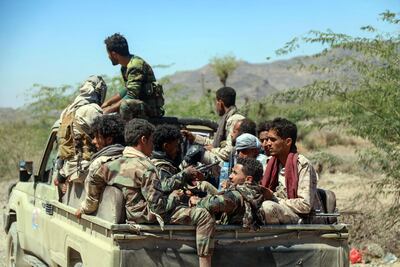Saudi Arabia announced an initiative on Monday to end the seven-year war in Yemen, proposing a national ceasefire, humanitarian measures and inter-Yemeni talks.
The initiative from Riyadh has been drawn up with UN envoy to Yemen Martin Griffiths and US envoy to the conflict Tim Lenderking. Saudi Foreign Minister Prince Faisal bin Farhan said that the initiative aimed to end the war.
The plan will include proposals for a national UN-supervised ceasefire, the reopening of Sanaa international airport to a number of direct regional and international destinations and the start of consultations between Yemeni parties to reach a political resolution. It will also include reconstruction and aid support to Yemen.
Prince Faisal said the "ball is now in the Houthis' court" to end the conflict and that a complete ceasefire could be followed by a political solution.
Prince Faisal addressed Iran's involvement in Yemen, asking for "an indicator" from the Iranians that they understand their neighbours' concerns.
"In Yemen we see them aiding the Houthis with advanced weaponry, targeting civilian airports and oil installations," he told a press conference in Riyadh. Any closeness with Iran requires "good intentions", he added.
In an earlier briefing, a senior Saudi official said the initiative would go into the implementation phase as soon as the Yemeni parties agreed to it.
“If the two parties – the government and the Houthis – agree to the initiative, the UN envoy will start to work on the mechanism,” he said.
The Houthis and the internationally recognised government have been locked in a power struggle since 2014, when the Iran-backed militias overran the capital Sanaa.
Saudi Arabia has led a coalition in support of the government since 2015. UN efforts to mediate an end to the conflict looked hopeful in December 2018 with an agreement reached in Stockholm for ceasefires in Hodeidah, Salif and Ras Issa and a successful prisoner exchange.
The ceasefires stagnated the conflict in those areas, but new front lines have sprung up. In recent weeks, Houthi rebels have been gaining territory near Marib, a government stronghold in the north of the country.

The city is seen as a safe haven, taking in internally displaced people from Houthi-controlled areas – it hosts over 130 displacement camps. If Houthis were to take control of the area, yet another humanitarian crisis would be sparked, sending millions fleeing fighting once more.
The rebels have also increased missile and drone attacks across the border into Saudi Arabia over the past few months.
A Saudi coalition official said the Houthis were facing increased casualties and had a choice between accepting the national ceasefire in the initiative or continuing the operation and risking a point of no return.
“If they continue with the offensive it would be a point of no return for national Yemeni army because we all know how important is Marib,” the official said.
Plan supported by Yemen's government and UAE
Yemen's internationally-backed government welcomed the plan, saying it was a "real test" of the Houthis desire for peace.
"The new initiative reflects the stance consistently expressed by the Yemeni government in all the negotiation rounds with the Houthi rebels: to alleviate the suffering of the Yemeni people" the country's Foreign Ministry said in a statement.
But the Houthi group said the proposals offered "nothing new".
"Any initiative that doesn't lift the blockade and meet the other demands is nothing," said Mohammed AbdulSalam, the spokesperson of the Houthi group.
UN spokesman Farhan Haq on Monday welcomed the kingdom's bid to revive talks with Houthi rebels, which he said "align" with UN peace envoy Martin Griffiths' efforts to end the conflict.
"Martin Griffiths has been working to secure a nationwide ceasefire, the reopening of Sanaa airport to civilian air traffic, allowing additional fuel and commodities to enter Hodeidah Port and resuming a political process to end the conflict," said Mr Haq.
"There's no doubt that every effort must be made to end the conflict and address the suffering of the Yemeni people."
The UN was "studying this proposal" from Riyadh for the potential deployment of UN monitors to ensure compliance with a ceasefire deal, added Mr Haq.
Monday's announcement followed extensive diplomacy by the US and emphasis on Yemen since Joe Biden's inauguration in January.
Dr Anwar Gargash, diplomatic adviser to UAE President Sheikh Khalifa, said the initiative represents a "real opportunity to end the suffering" in Yemen.
"The time has come for the guns to stop and heed the sincere invitation from Riyadh," he wrote on Twitter.
US envoy Mr Lenderking has made two trips to the Gulf since taking office, visiting Saudi Arabia and Oman. He met members of the Houthis leadership in Muscat last month, Reuters reported, and the US also removed the designation of the group as a foreign terrorist organisation. Instead, it separately imposed sanctions on two of its leaders for launching attacks on Saudi Arabia.
The US efforts have been focused on a ceasefire and allowing humanitarian aid into the country. This month, Mr Lenderking announced a return of US humanitarian assistance to Houthi-held territory in northern Yemen.
“Only through a durable ceasefire can we hope to reverse the direct humanitarian crisis,” Mr Lenderking said at an event on March 12.
Prince Faisal spoke to US Secretary of State Antony Blinken before Monday's announcement. The pair "discussed their close co-operation to support the efforts of UN special envoy Griffiths and US special envoy Lenderking to end the conflict in Yemen, starting with the need for all parties to commit to a ceasefire and facilitate the delivery of humanitarian aid," a State Department statement said.
Ali Mahmood in Aden, Yemen, contributed to this story.










